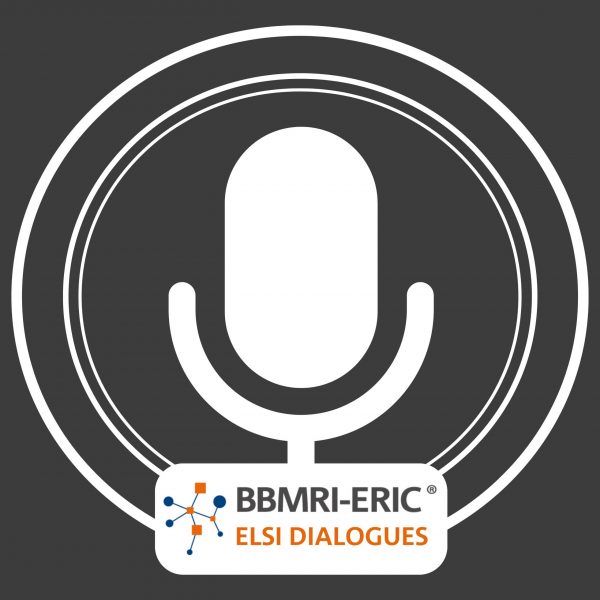I am looking for information as
Researcher

Industry

Patient

New Podcast Episode – ELSI Dialogues: Navigating the Future: Legal and IT Challenges, Risks, and Opportunities of AI in Biobanking
This article is 850 words and a three-minute read.
“The technology is there. What is not there immediately, is how to use the technology properly.”
Prof. Marco Montali
In episode 28 of the BBMRI-ERIC podcast, Ilaria Colussi, Data Protection Officer at BBMRI-ERIC, and two guest experts discuss legal and technical aspects of using AI tools for biobanking.
How can AI help modern biobanking? How can biobanks with their vast data and sample collections support the development of AI tools for e.g., medical diagnostics? And what are the legal frameworks that regulate the use and development of this rather young technology with its huge impact on humankind?
The EU AI act as pioneering attempt to legislate AI applications
New applications for AI tools and applications are currently blooming like spring flowers and it can be overwhelming to decide which of them can be integrated in one’s daily routine safely and responsibly. This holds true for personal use but especially for biobanking where large collections of sensitive biological samples and data are stored and made accessible for research.
Prof. Nikolaus Forgó (University of Vienna) is Professor for IT and IP law and a leading advisor e.g., as an expert member of the Austrian Data Protection Council and Member of the AI Advisory Board. In the first part of this episode, Prof. Forgó summarises the current state of the developing AI legislation in Europe:
“The pieces of legislation coming, in principle apply to everything. Be it Meta, be it a biobank, be it a public government institution. And two pieces of this legislation are of specific relevance for biobanks: The EU AI act and the EHDS (European Health Data Space) Act.”
Prof. Nikolaus Forgó
The EU AI act is globally the pioneering first legislation for a responsible use of AI. The challenge is to navigate how we can leverage the potential of AI applications in a responsible manner while securing privacy and safety rights of citizens and patients. Prof. Forgó describes the approach of the EU legislation to broadly assess the risks of AI applications:
“The AI act is the attempt of the European legislator to control the risks coming with AI. So, it’s mainly about assessment of risks and then introducing specific obligations for specific risk categories.”
Prof. Nikolaus Forgó
A technical view on implementing AI applications into biobanking
The second guest expert speaker, Prof. Marco Montali (Free University of Bozen-Bolzano, Italy), is an expert in Computer Engineering and was awarded by the Italian Association of Artificial Intelligence the best under 35 Italian researcher in Artificial Intelligence. In the second part of this episode, Prof. Montali discusses technical aspects and consideration that are relevant when AI tools are introduced into biobanking. Prof. Montali points out the current challenges of AI integration:
“The technology is there. What is not there immediately, is how to use the technology properly.”
Prof. Marco Montali
Biobanks are in a position where they can hugely benefit from algorithms that are able to process and analyse large amounts of data. Vice versa, biobanks can provide such large amounts of high-quality data including medical images, that are essential to develop and train these specialised AI tools in the first place. Prof. Marco Montali describes this reciprocal benefit for AI research and biobanking with an example:
“It’s not only biobanking helping AI, but AI helping biobanking, even before thinking about which problem we want to solve with AI. […] There may be a biobank in a country and a similar biobank in another country but there is no guarantee that these two can be integrated directly. […] So, a lot of AI research is being focused on being able to integrate, to reconcile, to prepare, to clean the data. Obviously, this is connected to data science as a whole for then fuelling other AI algorithms.”
Prof. Marco Montali
When humans and AI work together
A critical aspect that touches all points of this discussion is the question how we can optimally utilise human-AI interactions for the best possible outcome. Where is it essential to include human oversight? How can medical experts integrate AI support in their work to improve and accelerate diagnosis?
“You can solve, for example, 80% of the problems related to blood analysis essentially automatically. And the 20% instead they require a lot of deep expertise. So why instead of believing that we want to create an AI that is dealing with all of them, we set up an AI – there is technology to do that – that sorts out the 80% of the cases. And now – you see where the speed up comes from right now – as an expert, I can look into the 20% of the cases in all my time.”
Prof. Marco Montali
We need to understand and decide which tasks can be performed faster and maybe more reliably by an AI algorithm and which tasks strongly rely on the unique expertise of a trained medical expert. This is a challenge but also a huge opportunity for biobanking and biobank-related medical research and diagnostics.
Further reading:
The European Health Data Space (EHDS)







